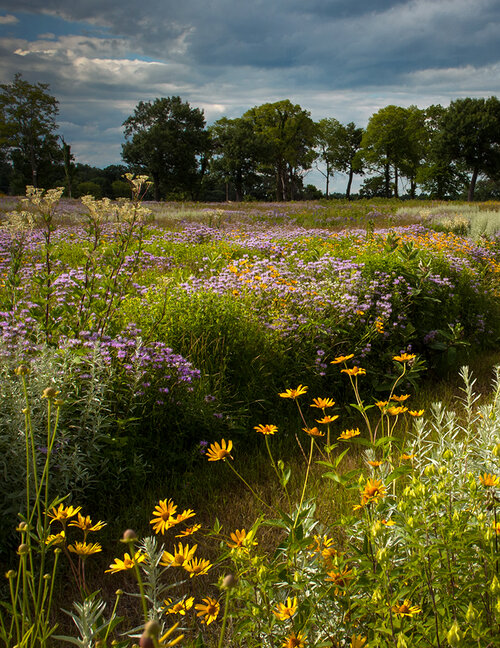About
Sustainability connects with all areas of R1's planning and programming: transportation, land use, housing, environment, economic development, community revitalization, and resiliency. R1 has a long history of promoting sustainable development across the Rockford region. In light of the escalating impacts of climate change, sustainability has now assumed an even greater prominence within the agency.
R1 supports sustainability through:
· Comprehensive regional planning efforts that promote the preservation, protection, and enhancement of natural resources
· Economic development that promotes the region's transition to a green economy and protects natural resources while improving quality of life and access to well-paying jobs
· Blight revitalization, creating healthier, more sustainable communities better equipped to handle the impacts of climate change

Sustainability Projects
Air quality refers to the level of pollution in the air. Greenhouse gas emissions (GHGs) pollute the air and contribute to global warming by trapping heat within the atmosphere. Currently, the Rockford region is an attainment area, which means its air quality meets or is cleaner than the national ambient air quality standards.
R1 wants to maintain and improve that status. As a regional planning agency, R1 is already connected with two sectors that are among the highest emitters of GHGs: transportation and economic development. Through its GHG inventory, air quality assessment, and other planning activities, R1 helps the region understand trends and strengthens preparedness and response strategies.
What is a Greenhouse Gas Emissions Inventory?
A GHG emissions inventory quantifies an area’s contribution to climate change. This inventory specifically tracks the regional release of GHGs that contribute to more intense climate impacts in Northern Illinois and across the globe. A GHG inventory is an essential tool for monitoring current emissions and informing future actions.
Air Quality Projects
Regional preparedness and response to climate change address environmental, economic, and social systems that exist beyond municipal boundaries. Proactive climate action planning helps the region become climate-resilient, which provides a higher quality of life for everyone.
R1 uses its regional reach to develop climate action planning documents for the Rockford region that encourage collaborative and informed action. In developing these documents, R1 works closely with diverse stakeholders to create and reach long-term goals related to mitigation, adaptation, and equity. These reports are publicly available, authoritative resources about the local impacts of climate change and can be found under the Plans and Studies tab below.
What is Climate Action Planning?
Climate action planning focuses on effective strategies to adapt to climate change in a way that meets the community's needs. A Climate Action Plan (CAP) assesses a region’s current conditions and develops implementation strategies to help meet climate action goals. The current climate conditions and needs of the Rockford region are explored through a regional greenhouse gas (GHG) emissions inventory, vulnerability assessment, and social determinants of health report.
CAP Projects
- R1 Climate Action Plan
- Executive Summary
- Community Impact Report #1. What Happens if We Do Nothing?
- Technical Report #1. Greenhouse Gas Emissions Inventory & Air Quality Assessment
- Technical Report #2. Vulnerability Assessment
- Technical Report #3. Social Determinants of Health & Climate Change
- Technical Report #4. Strengths, Weaknesses, Opportunities, and Threats (SWOT) Analysis
- Technical Report #5. Public & Stakeholder Engagement
- Rockford Mass Transit District (RMTD) Climate Action Plan
Energy efforts include both resiliency and clean energy initiatives. R1 supports and encourages the development and use of clean energy sources. This includes regional collaboration with the public and private sectors to enhance solar infrastructure and provide technical assistance for electric vehicle (EV) infrastructure deployment throughout Northern Illinois.
Additionally, R1 is a partner to an applicant team that has won two Department of Energy (DOE) grants to further equitable energy transitions and community disaster preparedness in the Rockford Region. Under these DOE grant programs, R1's role is to gather community insight through outreach, public engagement, and stakeholder relationships to understand the region’s needs and improve energy grid resiliency.
SolSmart Designation
SolSmart is a national designation program that provides a framework for municipalities, counties, and regions to reduce soft costs and take measurable action to support solar photovoltaic (PV) in their communities. Local governments that achieve the appropriate actions under SolSmart are designated as "solar-friendly.” R1 is currently in the process of attaining this designation.
Energy Projects
- Climate and Equitable Jobs Act (CEJA) programs
- DOE Resilient Communities via Risk-Driven Infrastructure Planning and Automated Restoration (Recuperat)
- DOE Deployment of a Community-Oriented Interoperable Control Framework for Aggregating and Integrating Distributed Energy Resources and Other Grid-Edge Devices (ICF)
- EV Charging Station Procurement
Natural lands provide ecosystem services including water supply and protection, wildlife habitat, and biodiversity. These lands can include forests, grasslands, wetlands, and greenways. Greenways are part of a network of green infrastructure spanning across urban and rural lands that link together parks, preserves, wetlands, unique habitats, and other environmentally sensitive areas. They provide an opportunity for natural circulation of plants and animals between habitats and across man-made features that may otherwise act as barriers.
Greenways are not only managed for their natural resource value but also for the associated benefits and services they provide to people and communities. This includes the promotion of active transportation and community safety, health, and well-being.
The objective of greenway planning is to promote a regional greenway network that protects natural and cultural resources, supports equal access to green space, provides alternative forms of transportation and recreational benefits, enhances environmental and scenic qualities, and stimulates equitable economic development.
Natural Lands Projects
Solid waste management serves a critical role in the health and safety of every community. As of 2019, only 18.2 percent of all waste generated within Boone and Winnebago Counties is diverted from landfills. Solid waste management planning aims to decrease the amount of waste entering landfills, extend the lifespan of local landfills, reduce greenhouse gas emissions, and increase sustainable waste management efforts, such as recycling or composting.
The need for future waste reduction and diversion infrastructure is vital, as the concentration of waste in remaining landfills, along with the lack of existing recycling and diversion infrastructure present an increasing need for alternative disposal methods. R1 provides a comprehensive assessment of the solid waste system in the Rockford Region and identifies waste infrastructure, generation, programs, issues, needs, opportunities, policy, and funding. This role is primarily fulfilled through the publication of a Regional Solid Waste Management Plan for Boone and Winnebago County, which is updated every 5 years.
Waste Projects
· Regional Solid Waste Management Plan for Boone & Winnebago Counties
R1 has led sustainable development in the Rockford Region since 2010 when the agency was formerly known as RMAP. Sustainable development refers to development that meets the needs of the present, without compromising the ability of future generations to meet their own needs.
R1’s sustainable development documents, “Vital Signs” and “A Blueprint to a More Sustainable and Dynamic Rockford Region,” seek to provide community leaders with measurable data across a broad spectrum of sustainability topic areas to drive decision-making. The data provides a baseline that can be used to track success, return on investment, and quality of life.
During the time of development of these plans (2010), the focus of the agency transitioned from short-term to long-range planning for regional sustainability. The goal was to achieve a unique sense of community and place, expand the range of transportation, employment and housing choices, equitably distribute the costs and benefits of development, preserve and enhance natural and cultural resources, increase security and safety, and promote public health.
Sustainable Development Projects
· Rockford Region Vital Signs: Regional Plan for Sustainable Development
· 2010-2040 A Blueprint to a More Sustainable and Dynamic Rockford Region
The Rockford Region is home to a high volume of surface and subsurface waters, including four major rivers: the Sugar, Pecatonica, Kishwaukee, and Rock River. Protecting the quality and accessibility of aquatic ecosystems and drinking water systems and supply is a high priority for the region.
R1 provides subject matter expertise for water resource planning and management to local municipalities and regional organizations. To assist the region in addressing long-term water supply and water quality concerns, R1 engages in a range of efforts such as scenario planning and pollution reduction education. Additionally, R1 is part of a multi-regional group to educate the public on the protection of groundwater quality in Northern Illinois.
Water Projects
- Blackhawk Hills Scenario Planning and Water Action Plan
- IEPA 319 – Watershed Education
- Integrated Water Resource Planning
- Winnebago County Small Community Water Security Assessment Report
- Winnebago Surface Water Management Ordinance
All sustainability-related plans and studies produced by R1 are available on the research and reports page, ordered alphabetically.
All sustainability-related plans and studies produced by R1 are available on this page, ordered alphabetically.
- 2010-2040 A Blueprint to a More Sustainable and Dynamic Rockford Region (2010)
- Bicycle & Pedestrian Plan for the Rockford Metropolitan Area (2023)
- Blackhawk Hills Scenario Planning and Water Action Plan
- Climate Action Plan (2025)
- Electric Vehicle Readiness Plan (2021)
- Greenways Plan for Boone, Winnebago, and Ogle Counties (2021)
- Greenways: A Green Infrastructure Plan for Boone and Winnebago Counties (2015)
- Keith Creek Corridor Study (2022)
- Regional Solid Waste Management Plan for Boone & Winnebago Counties (2022)
- Rockford Mass Transit District (RMTD) Climate Action Plan (2022)
- Rockford Region Vital Signs: Regional Plan for Sustainable Development (2014)
- Small Communities Water System Security Assessment and Report
- Winnebago Surface Water Management Ordinance
Technical Assistance
R1 extends its planning and research expertise to local municipalities and organizations to support their sustainable development and environmental projects. Project work includes writing plans, providing environmental technical assistance, presenting to stakeholders and the public, and supporting various environmental projects and initiatives.
The following documents include projects that R1 provided technical assistance to, contracted by and/or in collaboration with outside entities:
- Blackhawk Hills Water Action Plan
- City of Oregon Sustainability Plan
- Get the Lead Out: Lead Pipe Removal Community Conversation
- Rockford Mass Transit District (RMTD) Climate Action Plan
- Small Communities Water System Security Assessment and Report
- Winnebago Surface Water Management Ordinance
- Winnebago County, IL Multi-Hazard Mitigation Plan
Committees
- Community of the Future Advisory Council
- Kishwaukee River Ecosystem Partnership
- Metropolitan Mayors Caucus Environment Committee
- Natural Land Institute Land Conservation Committee
- Northern Illinois Regional Groundwater Protection Planning Committee
- Sustain Rockford
